NSG 210
West Kentucky Community And Technical College
Page 3 out of 39 results
Sort by
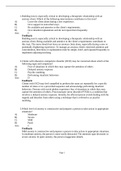
-
Chapter 68, Caring for Clients With Anxiety Disorders.
- Exam (elaborations) • 12 pages • 2022
-
- $10.49
- + learn more
1.Building trust is especially critical to developing a therapeutic relationship with an anxious client. Which of the following interventions contributes to this trust? A) Leave the client alone during a new experience. B) Give support in nonverbal ways. C) Be available and attentive to the client's requirements. D) Give detailed explanations and do not repeat them frequently. Ans: C Feedback: Building trust is especially critical to developing a therapeutic relationship with an anxiou...
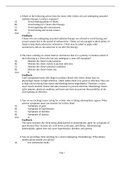
-
Chapter 18, Caring for Clients With Cancer
- Exam (elaborations) • 15 pages • 2022
-
- $8.49
- + learn more
1.Which of the following advice does the nurse offer clients who are undergoing unsealed radiation therapy to reduce exposure? A) Avoid drinking plenty of fluids. B) Avoid eating for 3 hours after therapy. C) Avoid applying skin moisturizers. D) Avoid kissing and sexual contact. Ans: D Feedback: Clients who are undergoing unsealed radiation therapy are advised to avoid kissing and sexual contact due to the spread of radioactivity. Clients are encouraged to drink plenty of fluids to hel...
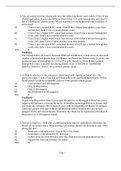
-
Chapter 30, Introduction to the Hematopoietic and Lymphatic Systems.
- Exam (elaborations) • 12 pages • 2022
-
- $8.49
- + learn more
1.You are caring for three clients who have the following blood count values: Client A has 24,500/mm3 white blood cells (WBCs), client B has 13.4 g/dL hemoglobin, and client C has a 250,000/mm3 platelet count. Which statement correctly describes the condition of each client? A) Client A has a normal WBC count, client B has a higher hemoglobin count than normal, and client C has a normal platelet count. B) Client A has a higher WBC count than normal, client B has a normal hemoglobin co...
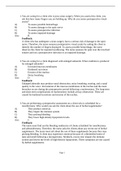
-
Chapter 20, Caring for Clients With Upper Respiratory Disorders
- Exam (elaborations) • 13 pages • 2022
-
- $8.49
- + learn more
1.You are caring for a client who is post–sinus surgery. When you assess this client, you ask him how many fingers you are holding up. Why do you assess postoperative visual acuity? A) To assess possible hemorrhage B) To assess damage to the optic nerve C) To assess postoperative infection D) To assess impaired drainage Ans: B Feedback: A client who has undergone a sinus surgery faces a serious risk of damage to the optic nerve. Therefore, the nurse assesses postoperative visual acui...
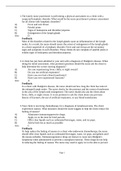
-
Chapter 32, Caring for Clients With Disorders of the Lymphatic System
- Exam (elaborations) • 13 pages • 2022
-
- $8.49
- + learn more
1.The family nurse practitioner is performing a physical assessment on a client with a suspected lymphatic disorder. What would be the nurse practitioner's primary assessment for all clients with lymphatic disorders? A) Fever and sore throat B) Painful joints C) Signs of leukopenia and thrombocytopenia D) Enlargement of the lymph glands Ans: D Feedback: Most of the disorders related to the lymph glands cause an inflammation of the lymph nodes. As a result, the nurse should assess the ...
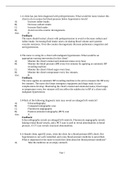
-
Chapter 27, Caring for Clients With Hypertension
- Exam (elaborations) • 12 pages • 2022
-
- $9.49
- + learn more
1.A client has just been diagnosed with prehypertension. What would the nurse instruct this client to do to restore his blood pressure below hypertensive levels? A) Increase iodine intake. B) Decrease sodium intake. C) Increase fluid intake. D) Avoid over-the-counter decongestants. Ans: B Feedback: The nurse should instruct clients with prehypertension to avoid or decrease sodium and iodine intake. Increasing fluid intake raises circulating blood volume and systemic vascular resistance...
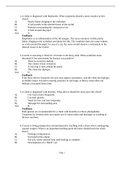
-
Chapter 42, Caring for Clients With Eye Disorders.
- Exam (elaborations) • 10 pages • 2022
-
- $9.49
- + learn more
1.A client is diagnosed with blepharitis. What symptoms should a nurse monitor in this client? A) Patchy flakes clinging to the eyelashes B) A red pustule in the internal tissue of the eyelid C) Redness surrounding the conjunctival sac D) A halo around the pupil Ans: A Feedback: Blepharitis is an inflammation of the lid margins. The nurse monitors visible patchy flakes clinging to the eyelashes and about the lids. The condition does not cause redness or a halo around the pupil. In case...
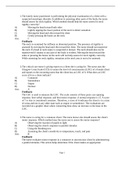
-
Chapter 36, Introduction to the Nervous System
- Exam (elaborations) • 12 pages • 2022
-
- $8.49
- + learn more
1.The family nurse practitioner is performing the physical examination of a client with a suspected neurologic disorder. In addition to assessing other parts of the body, the nurse should assess for neck rigidity. Which method should help the nurse assess for neck rigidity correctly? A) Moving the head toward both sides B) Lightly tapping the lower portion of the neck to detect sensation C) Moving the head and chin toward the chest D) Gently pressing the bones on the neck Ans: C Feedbac...
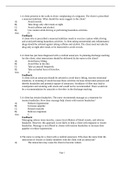
-
Chapter 38, Caring for Clients With Cerebrovascular Disorders
- Exam (elaborations) • 12 pages • 2022
-
- $8.49
- + learn more
1.A client presents to the walk-in clinic complaining of a migraine. The client is prescribed a neuronal stabilizer. What should the nurse suggest to the client? A) Avoid crowds. B) Take drugs only after meals at night. C) Avoid caffeine and alcohol. D) Use caution while driving or performing hazardous activities. Ans: D Feedback: A client who is prescribed a neuronal stabilizer needs to exercise caution while driving and avoid performing hazardous activities. A client taking nonsteroid...
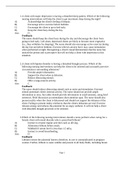
-
Chapter 69, Caring for Clients With Mood Disorders
- Exam (elaborations) • 12 pages • 2022
-
- $9.49
- + learn more
1.A client with major depression is having a disturbed sleep pattern. Which of the following nursing interventions will help the client to get maximum sleep during the night? A) Acknowledge the client's feeling of despair. B) Encourage active exercise before bedtime. C) Encourage the client to go to bed early. D) Keep the client busy during the day. Ans: D Feedback: The nurse should keep the client busy during the day and discourage the client from going to bed early. Left alone, depre...



